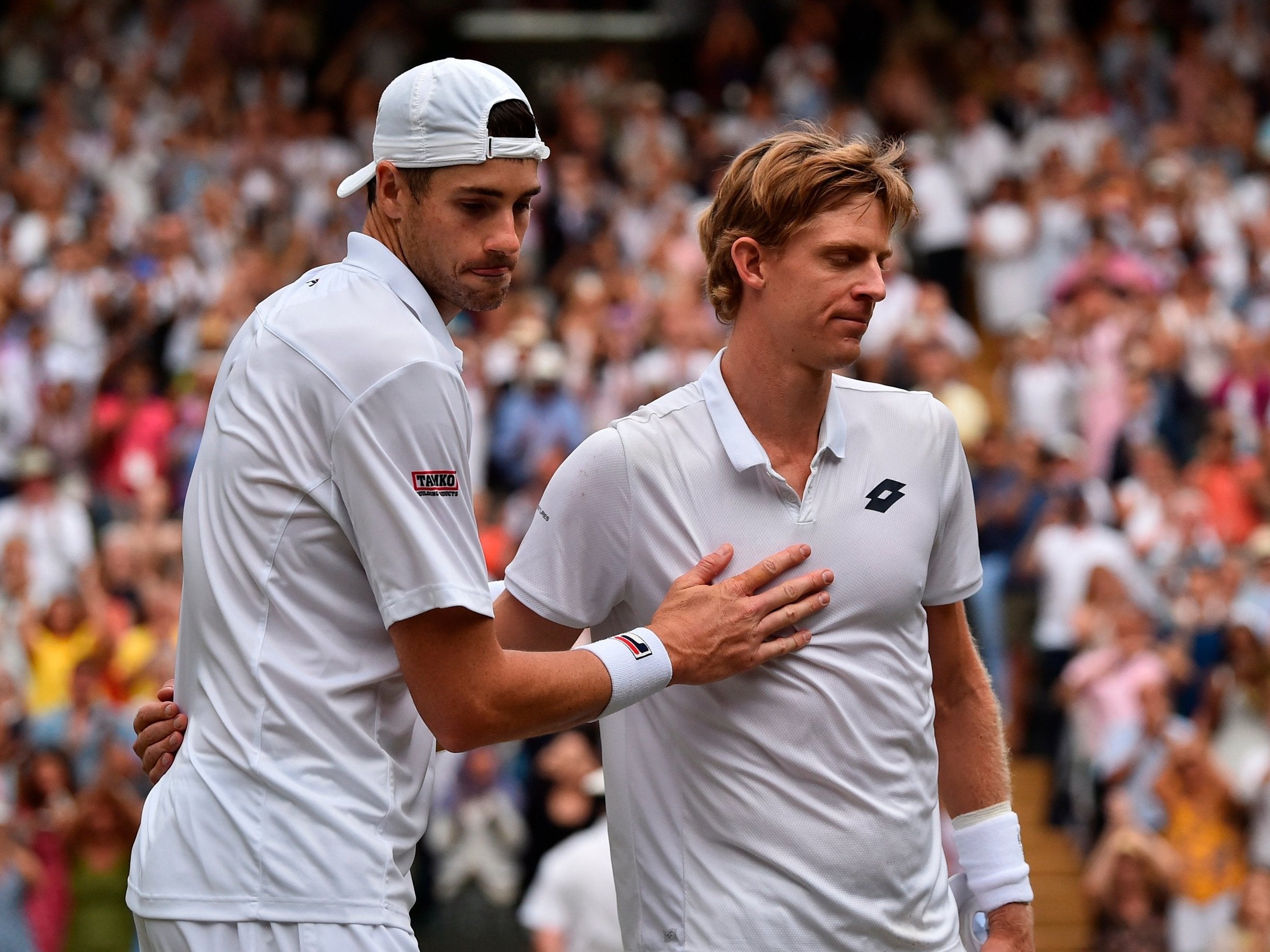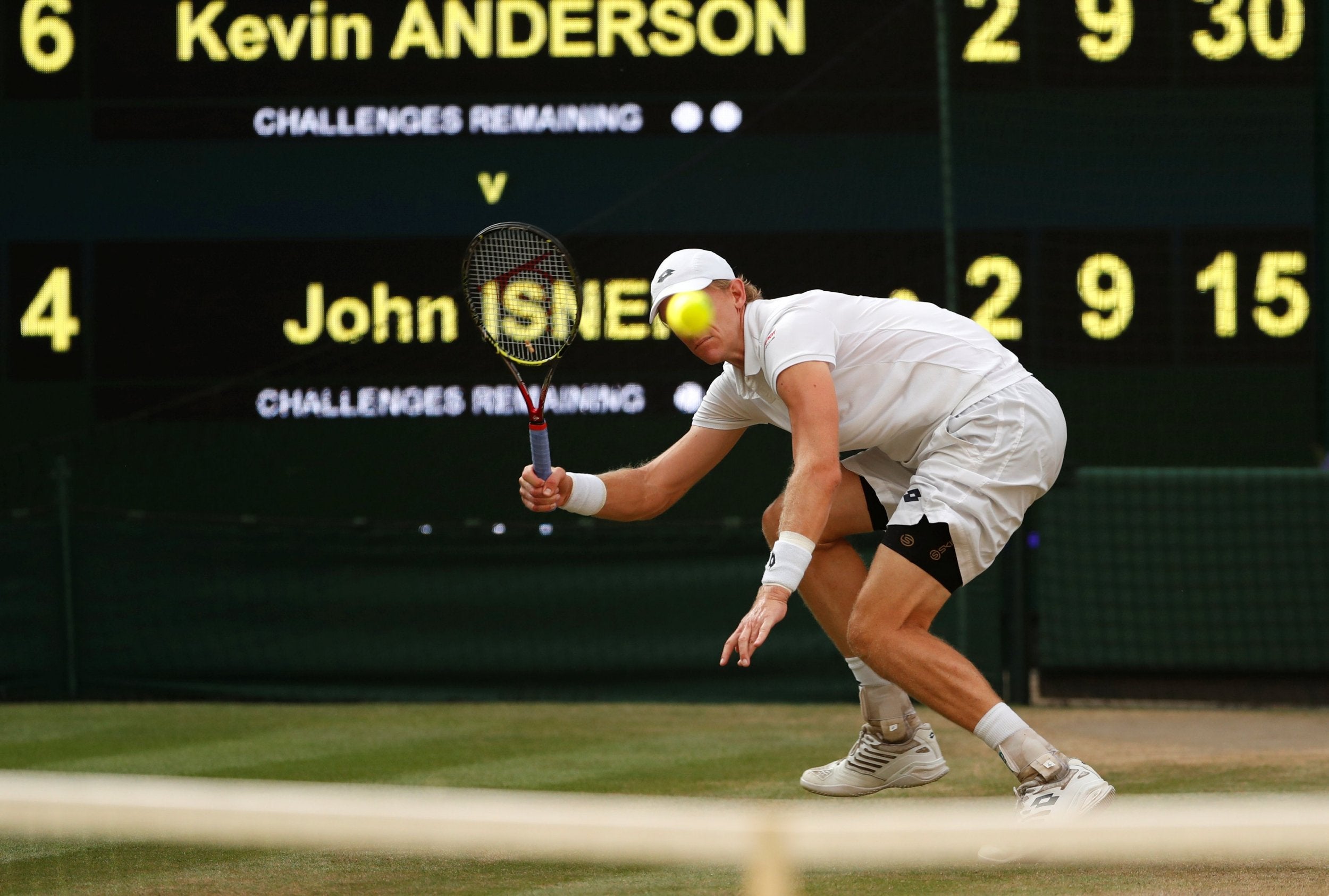Wimbledon 2018: Kevin Anderson and John Isner call for change after mammoth 50-game final set in semi-final
After beating Isner 26-24 in a final set slog, Anderson believes the current format cannot continue at majors if players’ health is to be looked after

Your support helps us to tell the story
From reproductive rights to climate change to Big Tech, The Independent is on the ground when the story is developing. Whether it's investigating the financials of Elon Musk's pro-Trump PAC or producing our latest documentary, 'The A Word', which shines a light on the American women fighting for reproductive rights, we know how important it is to parse out the facts from the messaging.
At such a critical moment in US history, we need reporters on the ground. Your donation allows us to keep sending journalists to speak to both sides of the story.
The Independent is trusted by Americans across the entire political spectrum. And unlike many other quality news outlets, we choose not to lock Americans out of our reporting and analysis with paywalls. We believe quality journalism should be available to everyone, paid for by those who can afford it.
Your support makes all the difference.With no end in sight to his Wimbledon semi-final, American John Isner sat slumped in his chair deep into the fifth set and pleadingly looked up at umpire Marija Cicak with a request: "Can we play a tie-break please?"
He knew the answer but after losing the longest-ever semi-final at Wimbledon 7-6 (8-6) 6-7 (5-7) 6-7 (9-11) 6-4 26-24 to South African Kevin Anderson in an epic that lasted six hours and 36 minutes – the longest ever semi-final at Wimbledon – calls to introduce a final set tie-break again grew louder.
"As an ex-athlete seeing these guys going for it, you have the utmost respect. But this is absurd," declared seven-times Grand Slam champion John McEnroe while commentating.
As the match wore on, social media went into meltdown with the jokes coming thick and fast, especially with Isner's marathon match history at the All England Club.
Eight years after being enshrined in Wimbledon folklore for winning the "endless match" – an 11 hour five minute humdinger against Frenchman Nicolas Mahut in 2010 – he was dragged into the second-longest ever match at the grasscourt major.
"It's May of 2039, Djokovic has just announced he's become a grandparent. Federer has opened a chain of Pineapple Pizza bistros, Andy Murray is running for MP. And Isner has finally broken Anderson to lead 5,588-5,587," one fan tweeted.
But for the two gladiatorial protagonists, and those involved in tennis, the contest was no laughing matter.
"It just seems cruel and unusual punishment for these guys," said McEnroe. "I hope this magnificent effort by these two experienced and very fit professionals allows the powers that be to make a change."

It was a sentiment echoed by an exhausted Anderson as soon as he came off court.
"I hope this is a sign for Grand Slams to change. For us to be out there for that length of time. I really hope we can look at this, because at the end you don't feel great," said the eighth seed who has less than 48 hours to get his fatigued body ready for the biggest match of his life.
In his last two matches alone, Anderson has been on court for almost 11 hours. He beat defending champion Roger Federer 13-11 in the fifth set of the quarter-finals before Friday's contest drained the life out of him.
"It's pretty tough in the format that we have right now. My feet are sore, they're swollen. The legs are pretty jelly-like," said the 32-year-old who reached his second major final after finishing runner-up to Rafael Nadal at last year's US Open.
"Maybe there's a middle ground that we can include a tiebreak at say 12-all. If a match is 12-all... I don't think it needs to continue.
"The amount of times it gets to that point is pretty rare. I think it protects the players' health as well. Because being out there for this length can be pretty damaging from a health standpoint, too."

Of the four Grand Slam tournaments, deciding set tie-breaks are only contested at the US Open when the score is at 6-all. The other three majors all play out the fifth set until the winner is ahead by two games.
"I personally don't see the added value or benefit compared to the US Open where we're playing tie-breaks in the fifth set," added Anderson, the first South African man to reach the Wimbledon final in 97 years.
"Obviously John's match in 2010 (against Mahut) was ridiculous, I feel like a lot of people were talking about it then. Things didn't change."
For Isner, who has come off second best in five-set marathons for the fourth successive year at Wimbledon, things simply cannot go on like this anymore.
"If one person can't finish the other off before 12-all, then do a tie-breaker there," said the American who was beaten 12-10 in the fifth set by Marin Cilic in 2015 and 19-17 by Jo-Wilfried Tsonga in 2016.
"I think it's long overdue. I can't say it enough, the rule needs to change."

Anderson added that it was not just the players who were losing out but fans, who had paid £170 to see two semi-finals, were also being short-changed.
"Most of the crowd would have preferred to see a fifth-set tiebreaker too. They've paid to see two matches and they came pretty close to only seeing one match," said the South African.
"It gets kind of ridiculous at some point in time when it's over 20-all. The crowd... they're pretty antsy for us to get off the court. They've been watching us for over six hours."
The knock on effect also meant Rafael Nadal and Novak Djokovic were kept waiting till past 8pm local time to start their semi-final and will have to return on Saturday to finish the match because they ran out of time before the 11pm curfew.
Reuters
Join our commenting forum
Join thought-provoking conversations, follow other Independent readers and see their replies
Comments